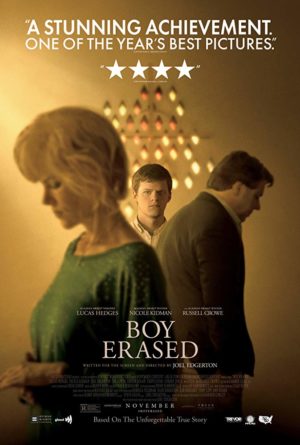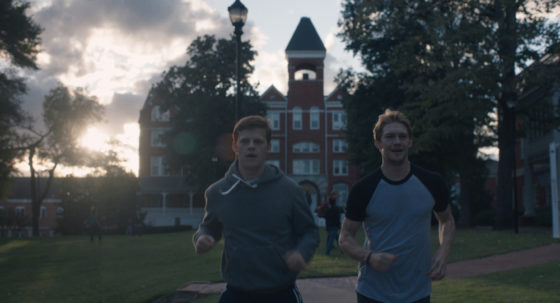
[Rating: Solid Rock Fist Up] 
The subtle power of Boy Erased, written and directed by Joel Edgerton and based on Garrard Conley’s 2016 memoir, comes from the hesitations. The movie shows the tentativeness and caution it takes to reach for human connection when your culture tell you it’s sick, and the bravery it takes to hope for reciprocity in those moments – whether romantic or otherwise.
Boy Erased is based on the true story of Conley (renamed Jared Eamons for the movie), the son of a Baptist pastor in Arkansas who survived gay conversion therapy at the hands of Love in Action (which now operates as Restoration Path).
Teenager Jared (an excellent Lucas Hedges) has the perfect Bible Belt life – the only son of local minister Marshall (Russell Crowe, fully embracing the Dad bod) and his southern belle wife Nancy (Nicole Kidman), Jared moves through high school with ease. He has an affectionate, trusting relationship with his parents and appears to have a lovely, textbook normal life.
At college, he finds a friend and running partner in blonde Adonis Henry (Joe Alwyn). But, an encounter between the two that starts as curiosity ends in assault (in an uncomfortable, awful scene that skillfully shows the victimhood of both, without letting anyone off the hook), and Jared’s parents receive a phone call from an unnamed counselor concerned about their son’s homosexuality. Marshall rallies the troops, summoning other pastors for counsel, and terrifying Jared. “What are they going to do to me,” he asks his mother. “Not to you,” Nancy says with a shaky smile. “For you.” The decision is made to send Jared to a gay conversion camp.
The conversion camp works off shame and isolation. The attendees (I’m reluctant to use the word ‘patients’) are instructed not to share anything that goes on there with their parents. They aren’t allowed to journal or use the restrooms alone or touch each other.

Leader Victor Sykes (Edgerton) depends on false equivocacies to drill sin and shame into the heads of young, often abused, non-hetero kids. They must make a family chart identifying any history of sin that might have contributed to current homosexual urges – and there is no room for ambivalence. Musician Flea gives a menacing performance as a counselor who reduces masculinity to sports and aggressive body posturing.
Sykes is hypocritical and ridiculous, and perhaps not as convinced of his own methods as his staff is. His need for control and dramatic admissions of sin appears to slowly break down his charges. When Jared has to stand up and present a list of his sins, he refuses to play Sykes game, and the counselor’s lack of real authority or power becomes obvious. After Jared calls his mom for assistance, Nancy has to make a choice between the rules of her faith and her instincts about her son.
Nicole Kidman plays Nancy with subtlety – a woman who knows her role and her place in her community, Kidman gives us glimmers of strength and humor in a character that could easily have been a Tammy Faye Baker caricature. Russell Crowe also performs his role deftly. Marshall is a man who is used to softening his absolute authority with Southern charm, and when he finds that no longer works, Crowe shows a real vulnerability to the character.
But Hedges brings it all together, portraying Jared as warm, naive and relatable in his desire for connection. He begins the story as a good kid trying to figure out how he fits into the world as he knows it, and he ends as an adult who found compassion and boundaries, rather than breaking or faking it in conversion.
The movie has some pacing issues, and took a little too long to wrap up. There are a few moments that may appear (particularly to those unfamiliar with the southern Christian culture) to descend into melodrama – but as someone who left the Christian right years ago, I can vouch for the accuracy.
Rather than taking the opportunity to bash religion and people of faith, Boy Erased shows you can have real love and redemption, as well as faith, and that parental love, not dogmatic religious morality, gives children their best chance in this world.




Comments on this entry are closed.